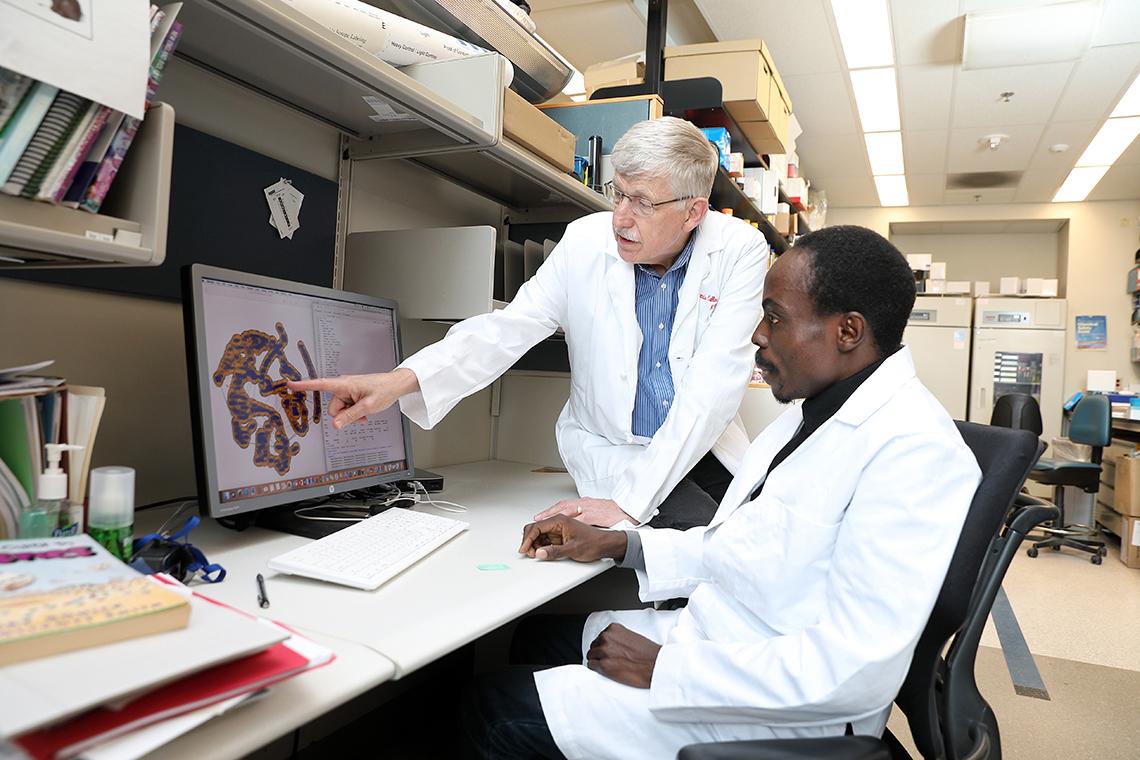New Fellowships Bring African Scientists to Train at NIH

Photo: Chia-Chi Charlie Chang
Last year, Dr. Idowu Aimola was teaching biochemistry at the largest university in Nigeria. Genomic research is rare there, he said, and applying data science to that research isn’t even mentioned in the curriculum. Today, he’s learning those skills in the lab of NIH director Dr. Francis Collins.
Aimola is one of 10 researchers participating in a new program called the African Postdoctoral Training Initiative (APTI). Fellows will spend 2 years in the lab of an NIH senior investigator, learning cutting-edge science while working on a research project of mutual interest. The immersion is intended to give the fellows the expertise to become research leaders when they return home and to foster collaborations between NIH scientists and institutions in Africa.
“I feel extremely fortunate. It’s a huge deal to me,” said Aimola, who has a Ph.D. in biochemistry and previously spent 9 months training in the U.S. through a Fulbright program. Working in Collins’ lab, Aimola will be engaged in high-tech single-cell biology. His project will try to understand why some people are predisposed to diabetes and he’ll use the techniques he’s learning to investigate how insulin-secreting cells in the pancreas are affected by genetic risk factors.
Aimola is familiarizing himself with statistical methods, single-cell library preparation and the software and algorithm tools to analyze genomic data, which he didn’t know existed before this experience. “It brings a huge opportunity to open up the minds of my students and research community back home and improve collaborative capacity with the NHGRI,” he said.
Senior investigators with seven institutes are hosting the fellows in the inaugural cohort. With diabetes a growing problem in Africa, it’s also the focus of a fellow who is working with NIDDK to explore nutritional causes of the disease. Four NIAID investigators have paired with African scientists who are studying the role of Staphylococcus aureus bacterium in wound healing, Lassa fever and other emerging viruses, malaria in pregnancy and multidrug-resistant malaria.
A fellow training with NHLBI will look at malaria and its relationship with another common ailment in Africa, sickle cell disease. NCI is hosting a scientist investigating childhood lymphoma. A fellow with NINR aims to focus on epigenetic research. And an NIEHS senior scientist is mentoring a fellow who wants to develop skills in molecular epidemiology.
The program’s goal is to harness and nurture promising research talent in the world’s fastest growing region. Because we are all descended from Africans, there is much to be learned from studying genetic variation across the continent and many research questions to be answered, Collins explained. “If what we want to do now is tackle some of the toughest problems that are going to need real teams to make it happen, we’re better off if those teams are populated by all kinds of smart people with different perspectives—and that often means from different countries.”
The APTI fellows—who hail from Egypt, Ethiopia, Ghana, Kenya, Mali and Nigeria—have spent the past few months settling into their new roles at NIH and to life in the U.S. The fellows established a WhatsApp group to keep in touch and Aimola says some of them went to see the cherry blossoms together.
During an event to welcome the fellows to campus, NHGRI’s Dr. Charles Rotimi—who was born in Nigeria and earned his undergraduate degree there—described his own journey to NIH and offered advice. “You are going to meet a lot of very bright people. Pick their brains,” he said. “The people you meet along the way are really going to define your career, if you take it quite seriously.”
The 4-year APTI program is a partnership of NIH, the Bill & Melinda Gates Foundation and the African Academy of Sciences and is managed by the Fogarty International Center. After 2 years at NIH, the fellows will return to their home institutions and receive 2 years of funding to help them continue their research and make the transition to becoming independent investigators. The program is intended to deter brain drain and build research capacity at African institutions.
“It is imperative to strengthen African scientific leadership to advance health and development goals on the continent,” said Dr. Trevor Mundel of the Gates Foundation. “Training from NIH, one of the world’s foremost biomedical research institutions, will help these scientists develop the transformational solutions the world and their communities urgently need.”
There are plans for a second cohort of fellows, with recruitment expected in 2020.
“Many of the things we’re excited about now, whether it’s the BRAIN Initiative or coming up with better treatments for cancer, are international efforts,” Collins said. “But Africa really hasn’t been at the table for most of those and this is an opportunity to change that.”
